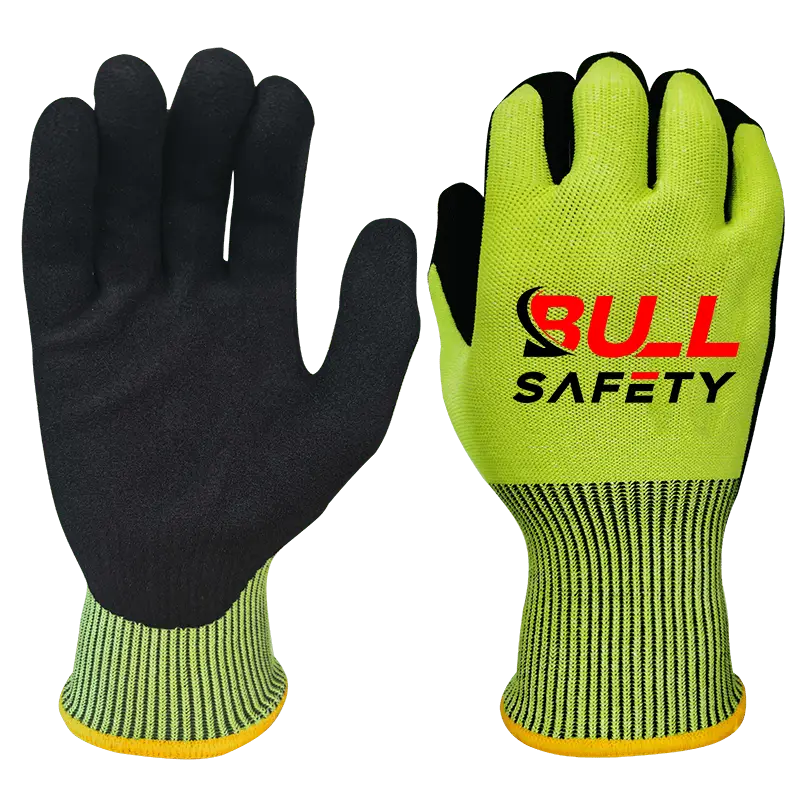
Nitrile coated gloves are one of the most widely used protective gloves in various industries. But what exactly makes them stand out from other coated gloves?
Nitrile coated gloves are made by dipping gloves into nitrile rubber, which enhances durability, oil resistance, and grip. They are popular for tasks requiring both high protection and dexterity.
When we first started producing nitrile coated gloves at our factory, we quickly saw their impact across different industries. Clients loved their oil resistance, superior grip, and overall durability. Over time, the demand for these gloves has only grown, proving their versatility in various work environments.
How Many Types of Nitrile Coated Gloves Are There?
Nitrile coated gloves come in several variations, each designed to meet different workplace needs. So, what are the main types?
There are four main types of nitrile coated gloves: smooth nitrile, sandy nitrile, foam nitrile, and double nitrile. Each offers unique benefits depending on the work environment.

Smooth Nitrile Coated Gloves
Smooth nitrile gloves are ideal for tasks that require high sensitivity and dexterity. Their smooth finish allows for a comfortable fit and flexibility, making them great for assembly, inspection, and electronics handling. While they offer excellent protection against oils and abrasions, they don’t provide as much grip as other coatings.
Sandy Nitrile Coated Gloves
Sandy nitrile gloves have a rough, textured surface that enhances grip, making them ideal for wet, oily, or greasy conditions. This extra texture improves friction and control when handling tools or materials. These gloves are commonly used in automotive, construction, and manufacturing industries.
Foam Nitrile Coated Gloves
Foam nitrile gloves offer a balance between flexibility and grip. The foam coating conforms better to the hand while providing excellent oil resistance. They are widely used for precision handling, light assembly, and material handling.
Double Nitrile Coated Gloves
Double nitrile gloves have two layers of nitrile coating, enhancing durability, puncture resistance, and chemical protection. These gloves are perfect for heavy-duty tasks in industries such as chemical handling, pharmaceuticals, and heavy machinery.
| Type of Nitrile Glove | Benefits | Common Applications |
|---|---|---|
| Smooth Nitrile | High dexterity, flexible | Electronics, light assembly, inspection |
| Sandy Nitrile | Superior grip, oil resistance | Automotive, construction, maintenance |
| Foam Nitrile | Dexterity with grip, oil resistance | Precision work, material handling |
| Double Nitrile | Extra durability, chemical protection | Chemical handling, heavy machinery |
What Are Nitrile Coated Gloves Used For?
Nitrile coated gloves are essential in many industries. But where are they most commonly used?
Nitrile coated gloves are widely used in automotive, healthcare, manufacturing, and food processing industries. They provide protection from oils, chemicals, and physical hazards.
Automotive and Maintenance
Mechanics and technicians prefer nitrile coated gloves due to their oil and grease resistance. Whether handling engine parts or automotive fluids, these gloves offer excellent grip and safety.
Healthcare and Pharmaceuticals
In healthcare, nitrile gloves are an excellent alternative to latex gloves, especially for those with allergies. They also provide protection against biological hazards and chemicals in pharmaceutical settings.
Food Processing and Handling
Food industry professionals rely on nitrile coated gloves for their barrier protection against oils and liquids. They are durable enough for long hours of handling food and packaging materials.
| Industry | Common Uses |
|---|---|
| Automotive | Handling engine parts, grease, fluids |
| Healthcare | Medical procedures, handling chemicals |
| Food Processing | Preparing and packaging food |
| Manufacturing | Assembly, maintenance work |
Are Nitrile Coated Gloves Heat Resistant?
Heat resistance is an important factor for some workplaces. So, do nitrile coated gloves provide adequate heat protection?
Nitrile coated gloves offer mild heat resistance, but they are not suitable for high-temperature tasks. For extreme heat, specialized heat-resistant gloves should be used.
While nitrile gloves provide excellent protection against oils and abrasions, they are not specifically designed for heat resistance. If high temperatures are involved, it’s best to opt for gloves made with heat-resistant materials like Kevlar or aluminized fibers.
Temperature Range
Nitrile coated gloves can typically withstand temperatures between -20°C to +100°C (-4°F to +212°F) for short periods. Beyond these limits, the material may degrade, reducing effectiveness and safety.
| Temperature Range | Use Case |
|---|---|
| -20°C to +100°C | General work, light heat exposure |
| Over +100°C | High-heat environments |
| Specialized Heat-Resistant Gloves | Welding, metalwork |
Can You Wash Nitrile Coated Gloves?
After extended use, washing your gloves might be necessary. But is it safe to do so?
Yes, nitrile coated gloves can be washed and reused if they are not heavily contaminated with harmful chemicals. However, frequent washing may shorten their lifespan.
Proper cleaning helps extend the life of your gloves. However, if they have been exposed to hazardous chemicals or biological contaminants, disposal is recommended.
How to Wash Nitrile Gloves
- Rinse off debris or dirt with water.
- Use a mild detergent or soap to wash.
- Rinse thoroughly to remove any residue.
- Allow gloves to air dry completely before reuse.
| Cleaning Method | Notes |
|---|---|
| Hand washing | Best for light dirt and oil. Use mild soap. |
| Machine washing | Only for lightly soiled gloves; avoid harsh detergents. |
| Disposal | Heavily contaminated gloves should be discarded. |
Conclusion
Nitrile coated gloves are an essential choice for workers needing durability, oil resistance, and flexibility. Whether you need gloves for automotive work, healthcare, food processing, or general manufacturing, choosing the right type can make all the difference in safety and performance.
If you have any questions or need recommendations, feel free to reach out to us. We’re here to help you find the best gloves for your business!
Contact Us for more information and product inquiries.



